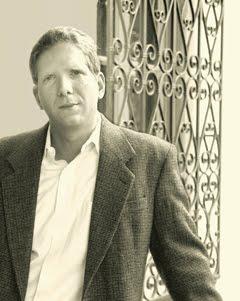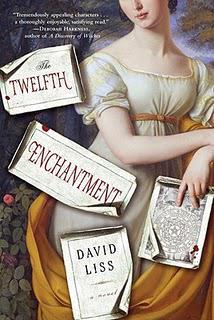 Zack Ruskin: Do you set yourself any boundaries when mixing fantasy into historical fiction? Are you willing to take any liberty with a real figure such as Lord Byron, or are some things off-limits?
Zack Ruskin: Do you set yourself any boundaries when mixing fantasy into historical fiction? Are you willing to take any liberty with a real figure such as Lord Byron, or are some things off-limits?
David Liss: When I started working on the book, I really wasn't sure what kinds of limits I was going to place on myself, since this was a new kind of book for me. For my more traditional historical novels, I've always operated under the motto that I don't always have to be right, but I should never be wrong. With this book, I ultimately decided I would stick to the same principles, but it would be more about appearances. I would do whatever I wanted with historical events and people as long as what happens would appear to be what really happened. I take plenty of liberties, but the difference between my fiction and the historical record would be invisible to an outsider.
Zack Ruskin: How important is the setting of Regency England to the story in Twelfth Enchantment?
David Liss: The setting is very important for many reasons. Regency-era labor disputes are at the core of the novel, as is the rise of romanticism, the Jane Austen world, the war with France, the Industrial Revolution, and numerous historical characters I wanted to play around with.
Zack Ruskin: What methods do you use to avoid too much history seeping into your prose?
David Liss: I alway put character and story before research, so as much as possible, I try to bring in historical detail in such a way that it seems like an organic part of the novel, and not something tacked on or a duty to discharge.
Zack Ruskin: You’ve recently worked in the field of comic books. How does writing a graphic novel differ from writing fiction? Do you think going through that process made you a stronger fiction writer?
David Liss: There are a many differences between writing graphic fiction and prose fiction, but the two major ones are (1) graphic stories are much more visual, and words are kept to a minimum; story should be told, as much as possible, through images; and (2) a single issue of a comic book is limited to 20 or 22 pages, usually with about five panels per page. In a novel, of course, words, not images, dominate and the story can be as long as its internal architecture demands. I like to think that a comic book script is like a sonnet -- there are strict rules that limit what you can do, but within those rules you can accomplish virtually anything. And yes, writing comics has helped me a great deal to become a more disciplined and controlled writer.
Zack Ruskin: Your novels have a tendency to fall into the categories of historical fiction and thrillers. Has history always riveted you, or is it more that you enjoy the challenge of taking static events and infusing them with new life?
David Liss: I've always enjoyed history and historical fiction, and I enjoy the challenges and limitations, as well as the opportunities, that historical novels present. I also love stories that have a suspense element, and I have often argued that all good stories are suspense stories, so combining the historical novel with the thriller always felt natural to me. I think the added challenge is that I often writer about financial history, which people are inclined to presume must be dull. However, I can't imagine anything less dull than characters who take spectacular risks to secure massive sums of money. The most difficult part of my job is reading a lot of dry material to extract the details that are fascinating and exciting.
Zack Ruskin: What is the process of plotting a book for you? Do you start with an timeline of what really happened in your chosen setting, and then weave characters in? Which element of the story usually strikes first for you?
 David Liss: Every novel I've written has begun with an opening scene. Something clear and exciting and dramatic will pop into my head, and I'll think, "I want to tell that story!" Then I figure out who these characters are who inhabit the scene and what is the larger world they inhabit. I always outline, and figure out the moving parts before I begin writing, but things often change as I begin to write. Sometimes that original opening scene gets written out of the novel, sometimes it moves to another spot, and sometimes it stays put.
David Liss: Every novel I've written has begun with an opening scene. Something clear and exciting and dramatic will pop into my head, and I'll think, "I want to tell that story!" Then I figure out who these characters are who inhabit the scene and what is the larger world they inhabit. I always outline, and figure out the moving parts before I begin writing, but things often change as I begin to write. Sometimes that original opening scene gets written out of the novel, sometimes it moves to another spot, and sometimes it stays put.
Zack Ruskin: Is there a particular period of history you wish you could’ve been present for?
David Liss: I don't think so. I love certain periods, especially 18th century England, but I would not have wanted to live there. We live in an incredibly privileged time, and I think it would be foolishness to idealize a time from the distant past. A particular time and place may have produced great minds or art or ideas, but that doesn't mean it would been a pleasant experience to live then and there.
Zack Ruskin: Which historical fiction writers should fans of your work should be reading?
David Liss: I don't want to say these writers produce books that are like mine, but some historical novelists whose works I very much enjoy include David Mitchell, Richard Zimler, Sheri Holman, David Anthony Durham, Ken Wishnea, Michael Faber, Kelli Stanely, Laura Joh Rowland, Matthew Pearl, Katherine Howe, and about two hundred others I'll wish I'd mentioned after I send this off.
Zack Ruskin: Correct me if I’m wrong, but I believe Lucy in Twelfth Enchantment is your first female protagonist. Did you find writing a female lead to be a challenge?
David Liss: In The Whiskey Rebels I had two protagonists, one of whom was a woman, but this is the first time I've written a novel entirely from a female character's perspective. Getting into Lucy's head took some doing, but in the end I think the historical setting gave me some cover. I found it easier to write about a woman from the past than I think I would if I tried to write a novel about a contemporary female protagonist.
Zack Ruskin: How did you research or think-up the magical elements of your new novel? Are they rooted in some kind of mythology?
David Liss: Virtually all the magic in the novel is based upon folk magic or ceremonial magic as it was actually practiced by people who believed in it. The theory of magic I use is based upon the writings of the great medieval and early-modern thinkers who believed in and practiced magic, especially Agrippa and Paracelsus. I wanted very much to ground magic in a realistic historical context.
A complete list of books by David Liss available through Book Passage can be found here
